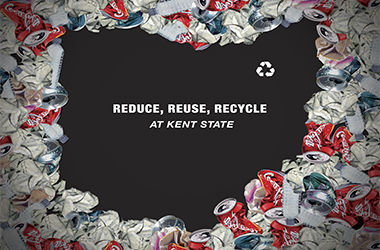Reduce, reuse, recycle on campus

Recycle
April 21, 2015
Six days a week, a packer garbage truck makes its rounds on campus, hauling away the average 6.6 tons of trash and recycling the university produces per day.
Often times, we don’t think about what happens to the water bottle we casually toss into a blue recycling bin after we’re finished with it. It may be gone from our hands, but it doesn’t disappear.
Recycling is collected by the Portage County Solid Waste Management and is taken to the Greenstar Plant in Akron to be processed and separated.
Corrugated cardboard is collected by University Facilities Management and hauled away by Republic Services. The university produces so much cardboard that it is hauled separately in a 40-yard compacter unit, said Rebekkah Berryhill, Kent State grounds supervisor.
“It’s amazing how many articles are just thrown away every single day that are completely recyclable,” Berryhill said. “This doesn’t just get neatly tucked away in a corner. Trash is dug into the Earth, and then our children’s children are going to have to deal with it.”
RecycleMania, an eight-week initiative that ended on March 28, encouraged students to head for the recycling bin instead of the trash can.
Leah Graham, outreach-recycling coordinator of the Office of Sustainability, said the campus recycling rate is 34.5 percent based on RecycleMania results.
Recycling is easier than ever since Kent State began accepting one to seven-type plastics beginning in January 2014. Previously, only types one to two were able to be recycled. If you look around campus, you’ll see blue recycling bins in every residence hall, cafeteria and administrative building.
“Sustainability is all about people, planet and prosperity,” Graham said. “We’re trying to place bins in more efficient places because studies have found that when trash and recycling bins are placed together, recycling rates have increased.”
When we hear the word “recycling,” we picture paper, glass, metal and plastic. It is a little-known fact that health and beauty items, including deodorant, shampoo bottles, toothbrushes and cosmetics, can also be recycled and taken to the Tri-Towers service desk and the Women’s Center. Additionally, every March, an e-waste drive is hosted where electronics, such as old laptops, DVD players and printers, are collected.
Paper to-go cups are also recyclable. So, the next time you pick up a latte from Starbucks, think twice before you throw it in the trash.
Before recycling, however, see if items can be reused,” Graham said. “Recycling is the “last step.”
The Throw-N-Go program helps to make reusing items more convenient by allowing students to drop off unwanted supplies at the collection bins placed in residence halls. Students can donate clothes, non-perishable food and miscellaneous dorm supplies, and the donated items go to Portage County Family and Community Services.
“A lot of students will buy things for the year that they’ll use while they’re here, and when summer comes, they’ll just get thrown away,” Chris Tankersley, assistant director of residence services, said. “These items may not have much value to students anymore, but to families receiving them, they really are helping out.”
Tankersley said Residence Services is keeping recycling in mind during their renovation projects. They’ve installed carpeting in lounges made from recycled soda bottles that looks the same as traditional carpeting but is more sustainable.
Students don’t need to use this avant-garde approach to make a difference, however. All they need to do is adjust some of their daily habits.
“It doesn’t take a whole lot,” Tankersley said. “There are little things students can do that seem very minor and trivial, but when we have all of you doing them, it makes a massive impact.”
Eco-friendly tips from recycling coordinator Leah Graham:
• Bring your own reusable mug or water bottle.
• Reuse paper by writing on the back.
• Shop at second-hand stores to eliminate the need for making new clothing.
• Bike or walk as a means of transportation (hint: use the Flashfleet bike-sharing program).
• Make sure your laptop is shut down if you’re not using it.
• Unplug chargers when you don’t need them.
• Use reusable bags to eliminate the need for plastic bags.
• Turn the lights off when you leave the room.
From Kent State Grounds Department:
Average Trash produced by Kent State Main Campus :
Yearly: 3,834,000 pounds or 1,917 tons per year
Monthly: 319,500 pounds or 159.75 tons per month
Weekly: 79,875 pounds or 39.93 tons per week
Daily: 11,411 pounds or 5.7 tons per day
Average Recycling (not including corrugated cardboard):
Yearly: 639,360 pounds
Monthly: 53,280 pounds
Weekly: 13,320 pounds
Daily: 1,902 pounds
Average Recycling of Corrugated Cardboard by UFM Grounds:
Yearly: 375,840 pounds
Monthly: 31, 320 pounds
Weekly: 7,830 pounds
Daily: 1,118 pounds
Contact Jamie Brian at [email protected].











